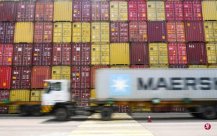Most foreign trade companies in South Korea predict that it is difficult to reverse the decline of exports to China during the year.
According to the Yonhap News Agency, the Korean Business and Industry Conference Institute announced on Wednesday (May 10) to investigate the 300 Korean companies that operate the export business of China.To the sluggish export of China.
As many as 40%of the companies interviewed predict that the inflection point of the bombardment of exports to China will appear after two to five years, and it significantly answers the proportion of rebounds of rebounds in the next year (27.3%) and (15.7%) in the year.In other words, 84.3%of the interviewed companies are not optimistic about exports to China this year.
It is believed that the scientific and technological gap between Korean and Chinese enterprises is shortened to less than three years.It is believed that the proportion of technological competitiveness of the two countries is also as high as 36.6%.41.3%of the company believes that China's technological development speed in the next five years will override to South Korea, and it is believed that the ratio of equivalent speed will be 35.3%.
32.7%of the company answered that the "national tide" consumption in China has caused Korean and middle products to decline in Chinese popularity.The export markets that are regarded as replaced by China are Asian (37.3%), India (31.7%), the United States (12.7%) and the Middle East (9%).
The Korean Commercial and Industry Conference analyzed that exports to China are the result of the comprehensive role of structural factors such as chip unit price decline, short -term profitability such as Chinese corporate inventory and the increase in self -sufficiency in China.Yu Taixi, executive vice chairman of the Korean Business Conference, said that the intensification of contradictions between China and the United States and the sealing of epidemics have accelerated the evacuation of foreign factories, and China's domestic efforts are also promoting to high -tech industries and high value -added products.In addition to the short -term policy of reversing the deficit as soon as possible, South Korea also introduces structural countermeasures to comprehensively enhance export competitiveness, such as strengthening the manufacturing industry and increasing investment in high -tech research and development.


